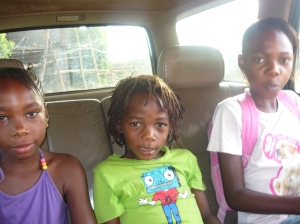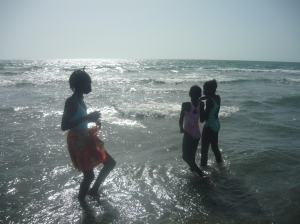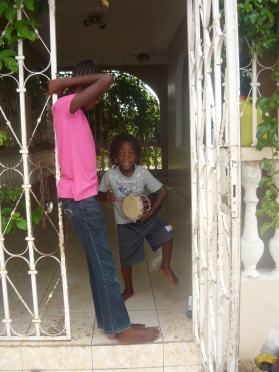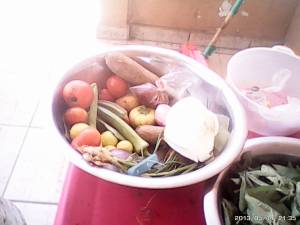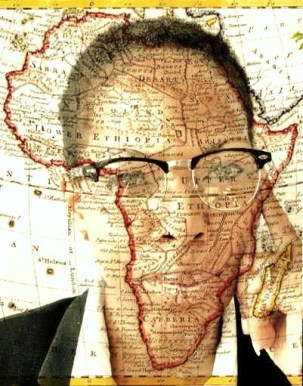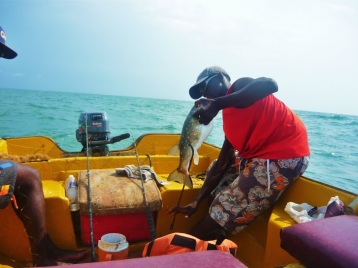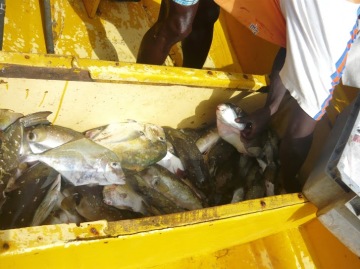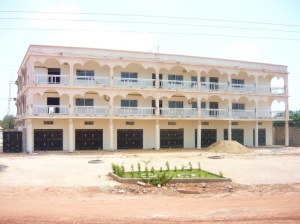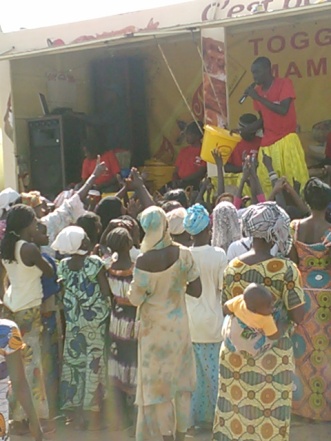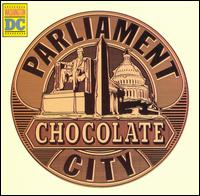Despite all the talking and rhetoric about Africa this and Africa that, one thing is for sure, when you are on the ground, you see an active and growing development. Somebody is funding the development of projects, buildings, real estate, housing, businesses etc. The process can seem like the natural progression of any country, as populations continue to grow, so shall this development. It may seem like a curious and mysterious endeavor until you decide you will be one who will build also, no longer will you just talk about Africa, but you will build.
No one can tell you the vast undertaking of building a house, anywhere for that matter, in Africa, and Gambia in particular where I built, I could not have comprehended the particulars that would confront me as the process began while I was still living in the States. Once we had situated a land to build upon, it was clear this land would mark my entry into the do realm and no longer the talk.

when there was no house, only soil, and earth. this would be the beginning of this long journey of repatriation…
My husband a Gambian had made connections with a contractor for us to begin the process. His name was Baba Drammeh, a contractor who was the brother of another Gambian living in the States, and he was well to do, being able to travel back and forth from the States to Gambia to meet with his clients. We decided to give Baba the contract to build our house, after visiting some of the buildings that he was working on, and visiting his own home that he built in Gambia, we were pretty impressed with his talent. We didn’t want a huge building, but a simple one level that we could eventually build on, a spacious modern home that could hold our modern amenities. My family was young, and with the spacious land, we could further develop on it later.

me standing in front of a house Baba Drammeh (left) our slimy contractor had showed us of his work. I was impressed until he started on our house.
Why Build a house instead of buy one already built?
I write this piece for the do-ers, those who want to build, because technically you can decide the kind of house you want, how much you are willing to spend, and where you want to live. The cost of already built homes can cost more than building one, and depending on your needs, it may be better to own the land first and then build the house.

Gambian men, builders, masons, workers you need them always…I am grateful for them.
Foundation
When I first started building my home in The Gambia, the neighborhood I would plant roots in, was a fertile crescent, with plenty of wide views, palm trees and open spaces. There were very few if any already built homes on the horizon. Being the first to build in the area was an advantage but on the other hand also a lot of hardship, as you are the first to deal with water issues, securing your plot, electricity and a host of problems you can’t be aware of until you start your project. For being the first meant the brunt of the learning curve fell on us, as there were no neighbors to turn to for support or help, as they turned to us when the neighborhood began to develop. The foundation of your home will be one of the most important if not the most important in the building process. It is the moment of truth when you realize your dream and seeing it start from nothing.
Building up
I was in The Gambia when my foundation was started and when the first blocks were being made, the ground being dug up to place in those blocks. Cement, sand and gravel crowding the space to create hundreds and hundreds of blocks. You can not believe the amount of work that goes into building. There are no tractors, cement trucks mixing the sediment, no bulldozers, everything is done by hand. Men mixing water, cement, and sand by hand, building blocks by hand, a tedious process that requires patience and resilience. But once the blocks are done, its literally a process of putting one on top of the other, and from there, a building is forming before your very eyes. From nothing to something. Amazing. Within three months, a bonafide building is up, you can determine window spaces, doors spaces, veranda, living room, bedrooms and bathrooms. In its rawest form it is a work of art, as cement is everywhere, the blocks are not pretty, and there is no roof on yet, its just this building. For many if their money goes short, this is where the building process stops, as you can see many buildings like this in developing Africa, incomplete, hoping to be completed. As for me I could feel this building inside of me, and me inside of it, how I would make a home out of it, have parties here, and being the first settlers in this new land. Putting the building up, is probably the easiest part of your project. No one tells you about the other intricacies involved until its time.

front of home…

I was so happy to see my home, and all its possibilities. I would work tirelessly to have this sanctuary…

the building is up, now the real work begins…
Security
You will always need somewhere to secure your building materials, as throughout your building process, you will be constantly buying materials, that if you are not careful can be lifted if not secured. Most people always build a storage room to hold their materials that can later be converted into a room to rent or whatever. But at first this room must be able to secure your materials, and you will require many things, from lumber wood, cement, all of ur building tools for the workers, at each stage, will require different materials. The next important security will be fencing your property, this ensures no one else can claim your acres, your space, this fencing is also usually concrete block slabs that you can build as high as you need/want to secure you compound. This is YOUR space thus, you do not want it compromised. Many people will put barb wire, broken glass and other objects on top of the fence to deter criminals. As they are many, who look to find the weakness in your security.

view from the roof of my home
Getting Robbed
If you have a very secure compound the likelihood of you getting robbed is low, but even then you can’t rule out workers, even the security you hire to look out for your materials, people on the ground will and can do all kind of scrupulous activity in the sale of your stuff if you are not there or aware of what’s going on. This is the reality, the best advise is to be on your project every day, and if you can not, be sure to have a trust worthy person there for you. This is key to having a successful project. Cause in many ways everybody is out to get you for one thing or another, and that can include the contractor who you are paying to do the work.

burgler proof bars, required on every home, even on the windows…
Roofing
I can’t stress the importance of ensuring you have the best work done on your roof. Knowing the correct materials were used in its waterproofing and its sturdiness. If the roof is not stable or is missing any key ingredient, expect for leakages of water to enter that could possibly destroy your property. I was not in Gambia when my roof was being done, however the money was sent and paid for all the materials to do the roof, but our contractor Mr. Drammeh, left out the black rock or asphalt, a key ingredient to ensure a sturdy roof, instead he pocketed the money and thought his theft would go un noticed. When the first rains came, my entire house leaked with each rain it got worse, the painting that had already been done in the house was completely ruined. Mr. Drammeh did not want to take any responsibility for his crime, but instead tried to insist it was the ‘worker’s fault. By that time, I had already moved to the Gambia and was living with my in laws while the house was being finished. This is to say, ensure what you pay for from top to bottom is what you are getting.

doing work on the roof, long hot days, trying to fix the roof, I’ll never forget!
Finishing
No one will ever tell you, the finishing is the most elaborate and expensive part to building your dream home in Africa in my case, The Gambia. You think ok, the building is up, the walls are up, the electric lines and plumbing is in, but there is more. Windows, doors, door frames, floor and wall tiling, toilets, tubs, door knobs, sinks and everything will be on you to fill. Light fixtures, ceiling fans, all the ‘stuff” you want in your house, will be up to you. Remember you’re building a house, not buying one that has all this stuff in it already, I can remember many days going to my compound cleaning and sweeping the tiles after the workers left, this was sacred ground to me, and I didn’t want any objectionable stuff laying around, when the workers leave, they don’t care what condition they left it in. Because we were basically hiring our own people to do the work, we no longer had trust with our contractor Mr. Drammeh, who still did not want to take responsibility for the roofing problems, so we basically paid for contracting work that he did not complete. Despite that we carried on, and finished the house, while having to pay almost twice for everything, Till this day the roof still has some problems when the rainy season comes, and getting people to be accountable for their shady work is hard to do in Gambia.

My parrot Xena and I, as I worried about finishing my house…
Water, Electricity & Sewage
These three are required elements to the quality of your living experience in Africa. Because unlike in the developed world, when you move in a house these things are already in place, but in Africa typically you must create them yourself. Be prepared to have a sock away built for your sewage, a water tank that can hold at least 100 gallons of water, if you’re smart, get a bore hole to regulate and maintain your own water usage that requires no bill. A bore hole will require an electrical outlet or a generator to ensure the pump in the ground can pump water to the tank. Be sure to secure your bore hole, as thieves stole my pump twice! Nothing is beyond stealing remember that. Electricity, now a days can be acquired by working with the electric company to install a pole that will transmit the line to your house, or you can do like me and be off the grid and get solar. I loved having solar, it takes getting used to regulating but it is a great resource to have in Africa, where there is plenty of sunshine and you do not have to pay for what you use.

My son in the master bathroom…

Solar panels, what I had always dreamed of. To own my electricity is real power!
The reality is having a home anywhere, but in particular for the African repatriate is about owning as much of your life as possible, this kind of freedom is not one that is usually followed when we speak about the generic word of freedom, but this is about as free as you can be without the restraints of society. You own your land, your home, your water, your electric, the rest is maintaining these liveables to enjoy your freedom, a state of being that I believe God truly put us on this earth to have.
Conclusion
In October of 2007, my house despite all the troubles, set backs and problems was finished, and I was able to move in with my family. It was and remains one of the brightest moments of my life. At this point I felt like a true Afrikan repatriate. Here I would raise my children, plant my trees, and enjoy the sun. Seven years in, my house requires quite a bit of renovation and upgrades, but in the meantime while I’m back in the States I hope to fund these renovations in time, I welcome you when they are done:-)

Living room, finished.

entrance to hallway and kitchen

outside/side of house finished…

me with cashew trees in the yard…
~Adjua

